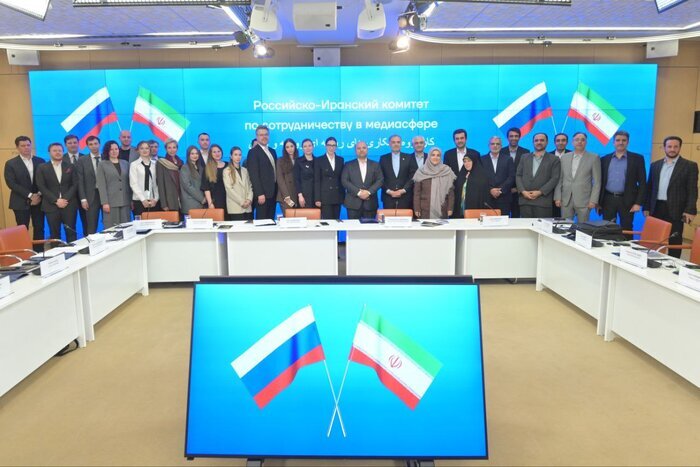Iran-Russia joint media cooperation working group held in Moscow

TEHRAN - The Iran-Russia Joint Media Cooperation Working Group was held in Moscow on Tuesday evening, with the participation of the Deputy Minister of Media and Advertising of Iran's Ministry of Culture and Islamic Guidance and the Deputy Minister of Communications and Mass Media of Russia.
The meeting began with the opening remarks of Mohammadreza Norouzpour and Bella Cherkesova, the heads of the Iranian and Russian delegations. The discussions were summarized with the presence of Kazem Jalali, the Iranian ambassador to Russia, Honaronline reported.
In his opening speech, Norouzpour elaborated on the capacities and capabilities of Iranian media. He emphasized that one of the main missions of the Iranian and Russian media is to enhance mutual understanding between the two nations.
The official pointed out that Iranians' understanding of Russia over the past two centuries has been shaped through the works of great Russian writers and poets, stating that Iranians know old Russia better than modern Russia.
“Information about modern Russia mainly comes through Western media sources, which is partly due to the lack of strong connections between the media of the two countries,” he added.
The deputy minister stressed the role of the media in strengthening the mutual understanding between the people of Iran and Russia and identified another area of cooperation as combating fake news.
“Media can help strengthen the joint cooperation capacities between Iran and Russia and encourage citizens to travel and explore the cultural, artistic, scientific, and tourism potentials of the other country,” Norouzpour emphasized.
He further proposed that Iranian and Russian artists, leveraging the cultural, political, economic, and tourism capacities of both countries, produce joint documentaries, films, and television series.
Strengthening cooperation in the field of book publishing, video games, and training courses for media professionals were among his other suggestions.
For her part, Bella Cherkesova referred to the signing of the Comprehensive Strategic Treaty between the presidents of Iran and Russia during Masoud Pezeshkian's visit to Moscow on January 17 and stated, “We highly value enhancing media cooperation with Iran within the framework of this treaty, and the joint media committee of both countries can help take practical steps in this regard.”
She called for enhanced connections between Russian and Iranian mass media, especially print media, noting that the role of media in deepening public understanding and implementing Moscow-Tehran agreements is very significant.
The deputy minister also expressed interest from several Russian media organizations, including Rossiya Segodnya, RT, and others, in expanding their media presence in Iran, opening representative offices, and broadcasting programs in Russian and Arabic.
Kazem Jalali, the Iranian ambassador to Russia, also spoke at the meeting, describing the strengthening of media cooperation between the two countries as a basis for flourishing bilateral relations.
Jalali mentioned the determination of the leaders of both countries to strengthen bilateral relations and elevate them to a strategic level with the signing of the Comprehensive Strategic Treaty. He highlighted the importance of intellectual support and the role of media in realizing the cooperation potential.
A number of media managers from Iran and Russia also participated in the meeting, presenting their capabilities and achievements and proposing ideas for expanding cooperation in the software and hardware domains of information dissemination and media.
In a separate meeting in Moscow, Norouzpour and Jalali met with Maria Zakharova, the director of the information and press department of the Ministry of Foreign Affairs of the Russian Federation.
The two sides stressed the strong determination of Tehran and Moscow to elevate media cooperation in line with the Comprehensive Strategic Treaty, enhance the exchange of experiences, hold training workshops, and focus on media literacy and joint efforts to combat fake news.
During the meeting, Jalali pointed to the positive trends in developing media cooperation and announced the facilitation of travel conditions and activities for Russian journalists in Iran. He emphasized the importance of strengthening media relations as one of the foundations of bilateral relations.
Norouzpour, while outlining the goals and programs of the Iranian media delegation, highlighted the strategic importance of relations with Russia in the foreign policy of the Islamic Republic of Iran.
“If the two nations seek to maintain and expand bilateral interactions, their media relations must grow at the same level as their political relations and reach a strategic stage,” he noted.
He also announced Iran's readiness to expand bilateral media interactions, hold joint workshops and educational seminars, and facilitate the presence of Russian journalists in Iran.
Maria Zakharova, in turn, expressed her pleasure with the presence of the high-ranking Iranian media delegation in Moscow and their active participation in joint media and specialized meetings.
“The Russian Federation views the development of media cooperation with Iran seriously and strategically and welcomes dialogues between media, the exchange of knowledge and professional experiences, and joint efforts to confront emerging threats such as fake news,” she added.
Zakharova also invited Iranian journalists and media managers to have a greater presence in Russia and especially to participate in the International Conference on Combating Fake News, hosted by Russia. She emphasized the importance of continuing targeted consultations and purposeful interactions in this regard.
SS/
Leave a Comment